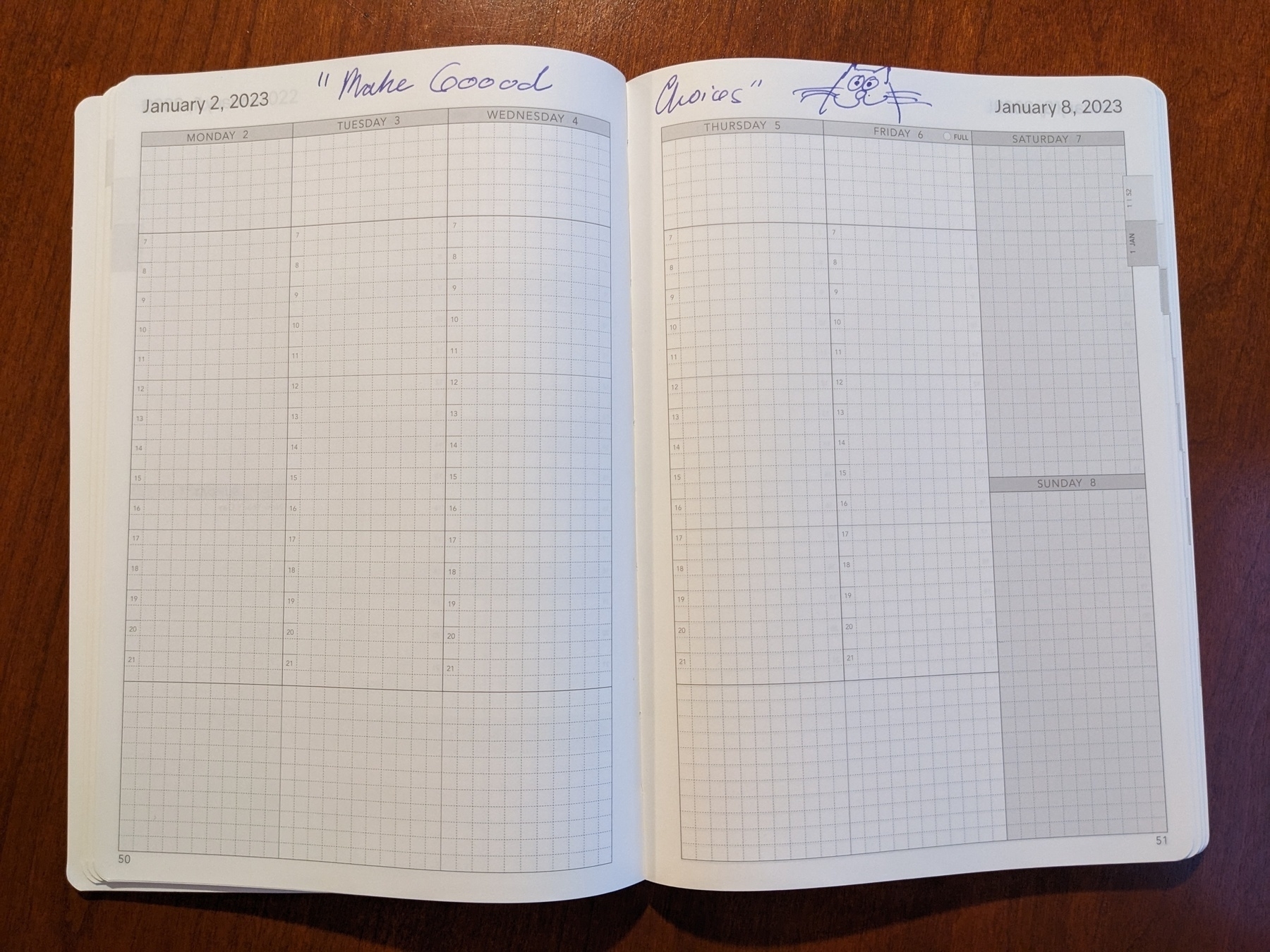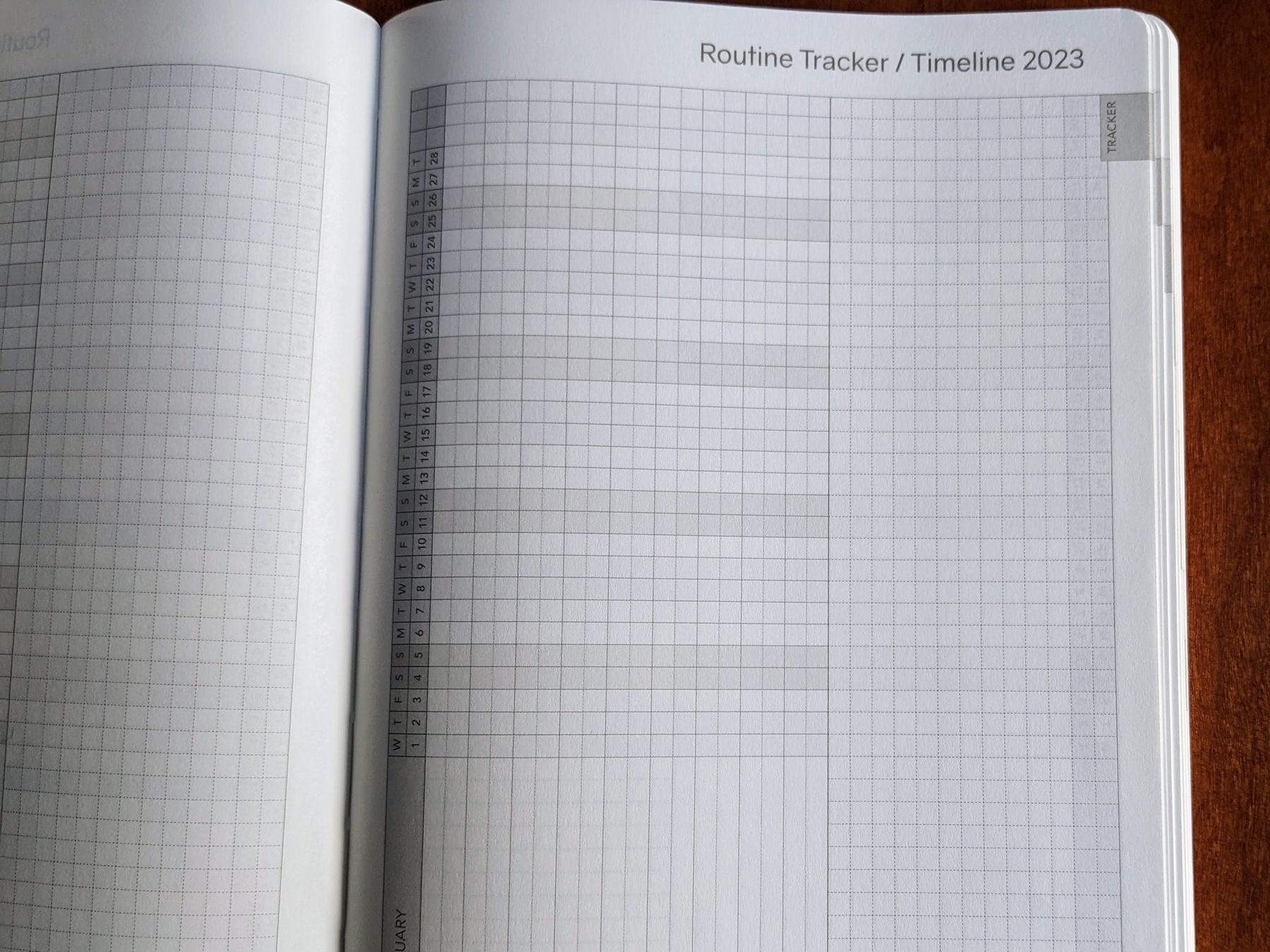For Habit Tracking and Health Improvement, Try a Paper Planner Instead of an App
I know many people who love using apps to track their health, including a relative who used his Apple watch to make some excellent lifestyle changes. He is motivated by the number tracking: calorie counts, exercise tracking, etc.
If this works for you, more power to you!
But I discovered, when I tried a Fitbit a few years ago, that I am de-motivated by health-related numbers. They bring up all kinds of emotions for me, ranging the gamut from “resentment” to “rebellion.”
When health-related numbers stream at me from an app, I feel like I am being micro-managed by a robot informed by every finger-shaking health-related article I’ve ever read.
An Apple Watch would send me straight to the couch with a bowl of Tillamook Mudslide while binge-streaming Drink Masters, because robots are not the boss of me.
So there, neener neener! I sure showed those health apps who’s in charge around here!
And… yeah… obviously I needed to figure out something else, for the health-related changes I actually did want to make.
I realized I needed to toss the apps.
What I needed, was a paper planner.
Numbers versus Narratives
For improving my health, I do MUCH better by creating a log that lets me create a narrative of my own.
I’m informed by the same health-related knowledge the apps use. I keep up with the science. I’m not resistant to health-related information per se; I’m resistant to it coming at me through an app.
Instead, I internalize health information by writing things down for myself.
A paper planner gives me the power I apparently crave: I am making the knowledge, creating the knowledge, reviewing the knowledge, and applying the knowledge, by observing myself and jotting down a few sentences about my observations.
And although I’m not motivated by numbers, I AM motivated by drawing cat cartoons for myself: “Make Gooooooood Choices, Anna!”

So there’s that.
My planner* gives me the typical monthly calendar spreads, as well as weekly spreads with a column to write in, for each date. Also: a routine tracker layout. Slick!

Well, So? Did Using a Paper Planner Actually Help You Make Changes, Anna?
It sure did! Thanks for asking!
A couple of years ago I decided I wanted to do whatever I could, to get a good night’s sleep. (Nobody likes me when I’m sleep-deprived: not even me. Especially not me; everybody else gets to leave the room.)
I don’t care how many times an app reports that I woke up during the night, or what my heart rate is, or any of that. I don’t get a sense of meaning from health-related numbers.
I get it from describing, in writing, how my mind and body actually feel, after I wake up.
A bad night’s sleep: sluggish physically, with a defeatist mindset, eyes feeling like there’s sandpaper under the lids. A good night’s sleep: energized physically, optimistic mindset, excited to start the day.
Before I go to bed, I note down in my planner what I did that day, that might affect how I sleep: alcohol and / or caffeine consumption, whether or not I got in some exercise, whether I watched an intense movie right before bed. I also check the time on my alarm clock before I hit the lights.
The next morning I make a note about when I observed “lights out,” and what time I woke up. I count up hours of sleep and jot that down. I write a sentence or two about how well I slept: did I get up a lot? Insomnia? Or did I snooze through the night (yay)? And then a sentence or two about how I feel: do I want to drag back to bed, or do I feel excited about engaging with this day?
In order to get a good night’s sleep, over the past two years, confronted with what I recorded in my planner, I made the following changes:
- installed blackout shades in our bedroom
- stopped drinking anything caffeinated after 2 p.m.
- cut down on alcohol use
- cut down on watching intense shows before bed
- increased time outdoors
- increased exercise
- set a “lights out” bed-time for myself
I also made some compromises.
I would certainly sleep better if we didn’t allow the cats in the bedroom. However, I love those little monsters, even when the Stripey One brings me his toy bird at 4:00 a.m. (The cats don’t wake my husband; so this one was my call.)
I would also sleep better if I didn’t stay up too late reading. Working on that one, still.
It Was Harder to Dismiss a Logbook in My Own Writing, Than It Was to Dismiss Health-Related Apps
What I like about my paper planner is that it is so personal.
I can ignore an app, rationalize it away. Much more difficult to rationalize away this daily log: I’m recording actionable information, and furthermore, it’s private.
I am observing myself, making notes in my own handwriting, figuring out what does, and does not work, over time.
It shows me my limits: e.g. the evidence in my own handwriting, shows that I really can’t have coffee after dinner, if I want to sleep well that night.
Paradoxically, my planner also shows me my power.
With a paper planner, I am making the knowledge, creating the knowledge, by observing myself and jotting down a few sentences to record my observations.
Because I created the knowledge bank, this knocks away my knee-jerk resistance to health-related information.
In my own handwriting, I see that when I choose to moderate alcohol and caffeine, when I choose to get moving, when I choose to put down the mystery novel and turn out the light, I choose the way I will feel the next morning.
I see that Night-time Anna has great power over how Next Day Anna will feel.
It is not an app telling me what to do (oh, the horror!).
Instead it’s my record of observing myself over time, learning from what I observe — and then acting on it.
So, yeah.
For me at least, it works.
Copy and share - the link is here. If you’d like to subscribe to Analog Office posts via newsletter, you can do that here.
NOTES
* I use an A5 Wonderland 222 planner, and as long as they make them, I will be buying them.
I buy two: one for habit tracking, one for conventional planning. These planners include Tomoe River paper for fountain pen people, thoughtfully designed layouts for yearly, quarterly, monthly planning and review — and dedicated routine and habit tracking layouts for each month. I think of this as the planner’s planner: great layouts for planning, and no inspirational quotes cluttering up my writing space thus leaving room for me to draw motivational cat cartoons for myself, as needed.
If your priorities for a planner are similar to mine (fountain pen friendly, a “let’s get down to business” design approach), check them out. I stick mine in journal covers, so I can tell the planning planner from the habit tracking planner at a glance.